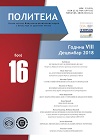From the 1857 Introduction to the 1867 Preface: Reflections on Marx’s Method in the Critique of Political Economy
From the 1857 Introduction to the 1867 Preface: Reflections on Marx’s Method in the Critique of Political Economy
Author(s): Bob JessopSubject(s): Epistemology, 19th Century Philosophy, Marxism, Philosophy of Science, Political economy, Methodology and research technology
Published by: Fakultet političkih nauka Univerziteta u Banjoj Luci
Keywords: Capital; cell form; cell theory; commodity; method of presentation; method of research; money; natural sciences; starting point;
Summary/Abstract: Marx noted in the Preface to the 1867 edition of Capital that beginning is difficult in all sciences. His work on this text reflected Marx and Engels’s view that there was only one science: history, embracing nature and society. Unsurprisingly, the natural sciences shaped their work in important ways. My article notes the impact of Darwinism, thermodynamics and cell biology in Marx’s analyses and examines the third of these in detail. When Marx eventually settled on the value-form of the commodity as his starting point in Capital, he described it as the economic cell form of the capitalist mode of production. This reflected a new step in his critique of political economy. For, in contrast to his account of two previous methods of political economy outlined in the 1857 Introduction, his subsequent interest in cell biology suggested a third method that would sublate and supersede them. The commodity provided the simplest, most apparent, and most immediate elementary unit of the capital relation and would serve both as a presupposition in his analysis and its eventual posit (result) as the analysis unfolded all its contradictory and dynamic implications for the logic of capital. This reflects his re-reading of Hegel’s Science of Logic, which was also concerned with the choice of starting point in exploring an organic totality. The cell analogy was useful as Marx sought the best starting point for his critique. In this context, I identify six parallels between cell biology and Marx’s analysis of the capitalist mode of production that might have influenced his starting point and subsequent analysis. But they remain analogies and guided neither his substantive research nor its presentation, which reflects the historical specificities of the capital relation. The article ends with some general conclusions on discovery, methods, and the method of presentation.
Journal: Politeia - Naučni časopis Fakulteta političkih nauka u Banjoj Luci za društvena pitanja
- Issue Year: 8/2018
- Issue No: 16
- Page Range: 15-37
- Page Count: 23
- Language: English

